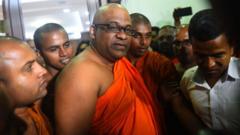Galagodaatte Gnanasara, a controversial Buddhist monk and a significant figure in Sri Lanka's Sinhalese Buddhist nationalist movement, has been sentenced to nine months in prison for making derogatory remarks about Islam and promoting religious animosity. The ruling was handed down by the Colombo Magistrate's Court on Thursday, marking a noteworthy development in a country that seldom prosecutes Buddhist clergy for such offenses.
The charges against Gnanasara stem from a media conference held in 2016, where he made statements deemed derogatory towards Islam. In addition to the prison term, he has been fined 1,500 Sri Lankan rupees (approximately $5). The court emphasized that the Constitution guarantees freedom of belief to all citizens, regardless of their religion.
Gnanasara, who served as a close ally to ousted former president Gotabaya Rajapaksa, has a history of legal troubles related to anti-Muslim sentiments. His sentences had previously included a six-year term for contempt of court, which was shortened to just nine months due to a presidential pardon in 2019 from then-president Maithripala Sirisena. Last year, he was jailed for inciting hate against the Muslim minority but was released on bail while appealing a four-year sentence.
His current appeal against the latest conviction indicates that the conflict surrounding religious identity and freedom in Sri Lanka remains deeply charged and complex. Following mass protests in 2022 that led to Rajapaksa's resignation amid a severe economic crisis, the political landscape in Sri Lanka has shifted, potentially influencing the future of state-religion relations and the treatment of hardline figures like Gnanasara. His leadership of a nationalist group and prior task force role under the Rajapaksa administration highlights the intersection of religion and politics in ongoing efforts to foster religious harmony in a country that has been plagued by ethnic and religious divisions.





















